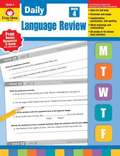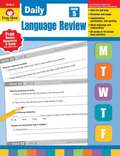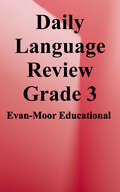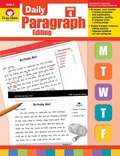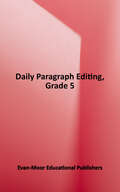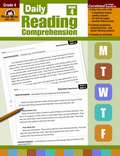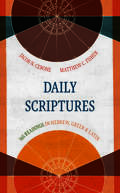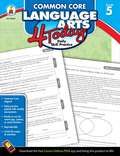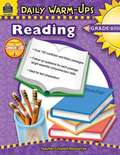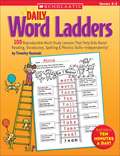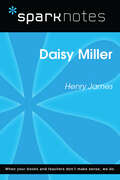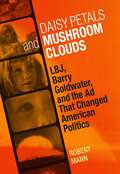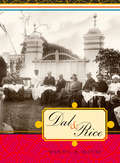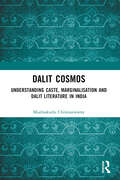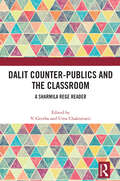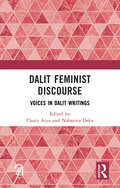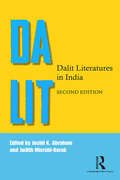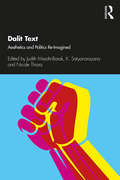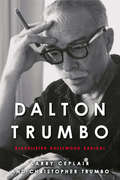- Table View
- List View
Daily Grams™ Student Workbook Grade 4: Guided Review Aiding Mastery Skills
by Wanda C. PhillipsThis book follows the same format as the accompanying Daily Grams Grade 4 Student Text. The first question is capitalization, the second punctuation, the third and fourth general concepts, the fifth question is related to spelling and question six is always sentence combining. Students will receive additional reinforcement, as well as the chance to actually work on review problems to ensure mastery learning. Pages are numbered by day, with one page per day.
Daily Language Review (Grade #4)
by Evan-MoorThe book provides five items for every day of a 36-week school year, presented in a standardized-testing format.
Daily Language Review (Grade #5)
by Evan-MoorThis book is divided into 36 weekly sections. Each weekly unit provides daily assessment activities.
Daily Language Review Grade 3 (Daily Language Review Ser.daily Language Review)
by Evan-Moor Educational PublishersWith Daily Language Review, students practice language skills covering punctuation, verb tense, conjunctions, word meaning, and more in ten- to fifteen-minute daily lessons. Daily Language Review follows the research-based model of frequent, focused practice to help students learn and retain skills. On days 1 through 4, half-page activities provide four language exercises: - two sentence-editing exercises - two items that practice a variety of language and vocabulary skills On day 5, a full-page activity provides a more extensive practice of a vocabulary strategy or skill, and gives students the opportunity to practice using the words in their own sentences. 36 weeks of daily practice activities cover: - Grammar and usage - Capitalization and punctuation - Spelling and spelling patterns - Vocabulary word meaning and relationships - Using acquired vocabulary Features and benefits: - Concise daily lessons are easy to scaffold and ideal for daily warm-up, quick informal assessments, and test prep The skills scope and sequence details the skills practiced each week - A downloadable skill list and answer key provides an item-by-item list of the skills practiced each day to help teachers identify student competencies - Each title includes downloadable home-school connection activities to encourage parent involvement - A progress chart and vocabulary log help students monitor their daily scores and keep track of new vocabulary.
Daily Language Review, Grade 6+
by Evan-MoorYou asked for it, and we listened! Now available for 6th gradel Provides five items for every day of a 36-week school year. For the teacher there are scope-and-sequence charts, suggestions for use, and answer keys. 112 pp.
Daily Life in Chaucer's England
by Jeffrey L. Singman Will McleanThe book covers clothing, food, leisure and work activities and the society which existed at the time of Chaucer's writing.
Daily Paragraph Editing (Grade #4)
by Evan-MoorHere's everything you need for standards-based daily practice on key language arts skills. Editing practice targets grade-level skills from the language arts curriculum, focusing on capitalization, punctuation, spelling, and language usage. Each weekly lesson includes a 4-paragraph composition for students to edit and a related writing prompt that generates an authentic writing activity.
Daily Paragraph Editing Grade 5 (Daily Paragraph Editing Ser.)
by Evan-Moor Educational PublishersDesigned to help students master and retain grade-level skills in language mechanics and expression through focused daily practice.
Daily Reading Comprehension Grade 4 - Student Practice Book
by Evan-MoorReading Comprehension Workbook for Grade 4
Daily Reading Comprehension: Grade 4
by Evan-MoorDaily instruction on the reading strategies and comprehension skills your students need to improve reading comprehension and raise test scores! Engage your students in reading, thinking about, and responding to a variety of passages and texts!
Daily Scriptures: 365 Readings in Hebrew, Greek, and Latin (Eerdmans Language Resources)
by Jacob N. Cerone Matthew C. FisherPastors, students, and scholars not in the midst of language coursework often find it difficult to maintain their knowledge of biblical languages like Hebrew, Greek, and Latin. For those looking to do so in a meaningful but manageable way, this devotional offers 365 short daily readings, pairing an Old Testament passage in Hebrew and Greek with a corresponding New Testament passage in Greek and Latin. Lexical notes in English are included as a way of facilitating a comfortable reading experience that will build one&’s confidence and ability in reading the Hebrew Bible, the Septuagint, the Greek New Testament, and the Latin Vulgate. &“Our goal and our purpose for this volume is to keep you in the languages, keep you fed in the Word, and hopefully spark a desire to explore more deeply how the New Testament at its core relies upon the Old Testament Scriptures.&”— from the introduction
Daily Skill Practice [Grade 5] (Language Arts 4 Today)
by Carson-Dellosa StaffBuild a foundation and focus on what matters most for language arts and reading readiness with Language Arts 4 Today: The Common Core Edition for fifth grade. This 96-page comprehensive supplement contains standards-aligned reproducible activities designed to focus on critical language arts skills and concepts that meet the Common Core State Standards. Each page includes 16 questions to be completed during a four-day period. The exercises are arranged in a continuous spiral so that concepts are repeated weekly. An assessment for the fifth day is provided for evaluating students' understanding of the language arts concepts practiced throughout the week. Also included are a Common Core State Standards alignment matrix and an answer key.
Daily Warm-Ups Reading, Grade 6
by Sarah Kartchner ClarkTeacher created resources that support National and State Standards.
Daily Word Ladders (Grades 2-3)
by Timothy V. RasinskiKids climb to new heights in reading and writing with these engaging, reproducible word building games! Kids read clues on each rung, then change and rearrange letters to create words until they reach the top. All the while, they're boosting decoding and spelling skills, broadening vocabulary, and becoming better, more fluent readers.
Daisy Miller (SparkNotes Literature Guide Series)
by SparkNotesDaisy Miller (SparkNotes Literature Guide) by Henry James Making the reading experience fun! Created by Harvard students for students everywhere, SparkNotes is a new breed of study guide: smarter, better, faster.Geared to what today's students need to know, SparkNotes provides:chapter-by-chapter analysis explanations of key themes, motifs, and symbols a review quiz and essay topics Lively and accessible, these guides are perfect for late-night studying and writing papers.
Daisy Petals and Mushroom Clouds: LBJ, Barry Goldwater, and the Ad That Changed American Politics (Voices of the South)
by Robert MannThe grainy black-and-white television ad shows a young girl in a flower-filled meadow, holding a daisy and plucking its petals, which she counts one by one. As the camera slowly zooms in on her eye, a man's solemn countdown replaces hers. At zero the little girl's eye is engulfed by an atomic mushroom cloud. As the inferno roils in the background, President Lyndon B. Johnson's voice intones, "These are the stakes -- to make a world in which all of God's children can live, or to go into the dark. We must either love each other, or we must die."In this thought-provoking and highly readable book, Robert Mann provides a concise, engaging study of the "Daisy Girl" ad, widely acknowledged as the most important and memorable political ad in American history. Commissioned by Johnson's campaign and aired only once during Johnson's 1964 presidential contest against Barry Goldwater, it remains an iconic piece of electoral propaganda, intertwining cold war fears of nuclear annihilation with the increasingly savvy world of media and advertising. Mann presents a nuanced view of how Johnson's campaign successfully cast Barry Goldwater as a radical too dangerous to control the nation's nuclear arsenal, a depiction that sparked immediate controversy across the United States. Repeatedly analyzed in countless books and articles, the spot purportedly destroyed Goldwater's presidential campaign. Although that degree of impact on the Goldwater campaign is debatable, what is certain is that the ad ushered in a new era of political advertising using emotional appeals as a routine aspect of campaign strategy.
Daisy class 6 - JCERT
by Jharkhand Council of Educational Research and Training RanchiThe textbook "Daisy" is designed for Class VI students and aims to enhance their English language skills. It follows a learner-centered approach that integrates the students' school activities with their outside experiences. The book includes various age-appropriate texts, both prose and poetry, on themes such as nature, family, national heritage, and imagination, among others. The goal is to promote effective communication, discourage rote learning, and encourage active participation. The book also incorporates activities, exercises, and projects to develop reading, writing, speaking, and listening skills, with a focus on vocabulary, grammar, and comprehension. Additionally, the book encourages critical thinking and creativity through discussions, role plays, and hands-on projects. The text is structured to provide a joyful learning experience, reduce curricular burden, and cater to the psychological needs of children.
Dal and Rice
by Wendy M. DavisWendy Davis inherited this affection for India and its people. In Dal & Rice she chronicles the memories of her childhood and offers a poignant and measured character study of her father. Her story is part social history, part travelogue, but mostly a very personal account of a relationship with an exotic, chaotic, and often mysterious country.
Dal and Rice (Footprints Series #8)
by Wendy M. DavisWendy Davis inherited this affection for India and its people. In Dal & Rice she chronicles the memories of her childhood and offers a poignant and measured character study of her father. Her story is part social history, part travelogue, but mostly a very personal account of a relationship with an exotic, chaotic, and often mysterious country.
Dalit Cosmos: Understanding Caste, Marginalisation and Dalit Literature in India
by Mudnakudu ChinnaswamyThis book is a fierce argument against social and caste discrimination in India, especially untouchability and emphatic call for social justice. Written by a first-generation Kannada Dalit writer, the book provides an insider’s view of caste discrimination as the author has lived through and experienced it. It traces the roots of present-day activism against caste discrimination, the influence of Ambedkar, the rise of Hindutva, and the role of Dalit literatures in shaping discourses around caste in India. An invigorating collection of essays and speeches by Mudnakudu Chinnaswamy, this volume will be of great interest to scholars and researchers of discrimination, literature, politics and political philosophy, exclusion studies, race, social justice, cultural studies, and South Asian studies.
Dalit Counter-publics and the Classroom: A Sharmila Rege Reader
by Uma Chakravarti V. GeethaThis book is an anthology of the collected essays of Sharmila Rege (1964 – 2013) that addresses themes to do with pedagogy and culture. Rege makes a compelling argument for rethinking the content of sociological knowledge and invokes in this context, Anticaste radical philosophies, associated with Mahatma Phule and Babasaheb Ambedkar as well as the writings of Dalit women. Equally, she seeks to rethink and engender the domain of Cultural Studies. She calls attention to 'Dalit counter-publics', comprising performance and commemorative traditions that are committed to ending the caste order and argues for a critical rethinking of the relationship between caste, sexuality, and popular culture.Framed and annotated by an introduction that places Sharmila's work in the intellectual and historical contexts that shaped it, the volume also features short prefatory notes by her colleagues on the various themes taken up for discussion. Addressing, as it does, the researcher, the activist and the teacher, the book is indispensable for students and researchers of Women’s Studies, feminism, gender studies, Dalit Studies, minority studies, Sociology, Cultural Studies, Performance Studies, as well as studies in language and rhetoric.
Dalit Feminist Discourse: Voices in Dalit Writings
by Charu Arya Nabanita DekaCharu Arya and Nabanita Deka’s edited book, Dalit Feminist Discourse: Voices in Dalit Writings documents Dalit voices from different regions and languages of India. Divided into three sections, the aim of this book is to foster a Dalit feminist discourse by reading Dalit writings. The contributors of the anthology in their respective chapters pick up different Dalit texts written by both Dalit men and women to analyse how Dalit women subjectivities have emerged over the years.The subject matter in this book covers the theories and history of Dalit feminism, poetry and writings by Dalit women, and also explores the politics of gender, society, and caste from the perspective of this section.Print edition not for sale in South Asia (India, Sri Lanka, Nepal, Bangladesh, Pakistan or Bhutan)
Dalit Literatures in India
by Joshil K. Abraham Judith Misrahi-BarakThis book breaks new ground in the study of Dalit literature, including in its corpus a range of genres such as novels, autobiographies, pamphlets, poetry, short stories and graphic novels. With contributions from major scholars in the field, alongside budding ones, the book critically examines Dalit literary production and theory. It also initiates a dialogue between Dalit writing and Western literary theory. This second edition includes a new Introduction which takes stock of developments since 2015. It discusses how Dalit writing has come to play a major role in asserting marginal identities in contemporary Indian politics while moving towards establishing a more radical voice of dissent and protest. Lucid, accessible yet rigorous in its analysis, this book will be indispensable for scholars and researchers of Dalit studies, social exclusion studies, Indian writing, literature and literary theory, politics, sociology, social anthropology and cultural studies.
Dalit Text: Aesthetics and Politics Re-imagined
by K. Satyanarayana Judith Misrahi-Barak Nicole ThiaraThis book, companion to the much-acclaimed Dalit Literatures in India, examines questions of aesthetics and literary representation in a wide range of Dalit literary texts. It looks at how Dalit literature, born from the struggle against social and political injustice, invokes the rich and complex legacy of oral, folk and performative traditions of marginalised voices. The essays and interviews systematically explore a range of literary forms, from autobiographies, memoirs and other testimonial narratives, to poems, novels or short stories, foregrounding the diversity of Dalit creation. Showcasing the interplay between the aesthetic and political for a genre of writing that has ‘change’ as its goal, the volume aims to make Dalit writing more accessible to a wider public, for the Dalit voices to be heard and understood. The volume also shows how the genre has revolutionised the concept of what literature is supposed to mean and define. Effervescent first-person accounts, socially militant activism and sharp critiques of a little-explored literary terrain make this essential reading for scholars and researchers of social exclusion and discrimination studies, literature (especially comparative literature), translation studies, politics, human rights and culture studies.
Dalton Trumbo: Blacklisted Hollywood Radical (Screen Classics)
by Larry Ceplair Christopher Trumbo&“Trumbo emerges from this well-rounded biography as a larger-than-life figure, not unlike the characters he scripted for the screen.&” —Publishers Weekly James Dalton Trumbo is widely recognized as a screenwriter, playwright, and author, but he is also remembered as one of the Hollywood Ten who opposed the House Un-American Activities Committee. Refusing to answer questions about his prior involvement with the Communist Party, Trumbo sacrificed a successful career in Hollywood to stand up for his rights and defend political freedom. In Dalton Trumbo, Larry Ceplair and Christopher Trumbo present their extensive research on the famed writer, detailing his work; his membership in the Communist Party; his long campaign against censorship during the domestic cold war; his ten-month prison sentence for contempt of Congress; and his thirteen-year struggle to break the blacklist. The blacklist ended for Trumbo in 1960, when he received screen credits for Exodus and Spartacus. Just before his death, he received a long-delayed Academy Award for The Brave One, and in 1993, he was posthumously given another for Roman Holiday. This comprehensive biography, which includes excerpts of Trumbo&’s letters, notes, and other writings, also provides insights into the notable people with whom Trumbo worked, including Stanley Kubrick, Otto Preminger, and Kirk Douglas, and a fascinating look at the life of one of Hollywood&’s most prominent screenwriters and his battle against persecution.

